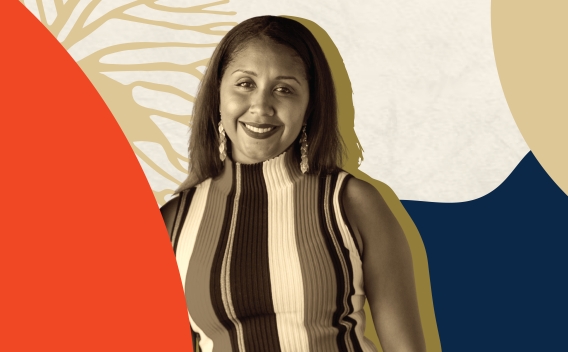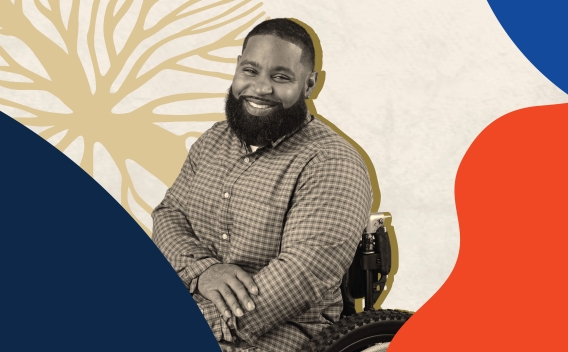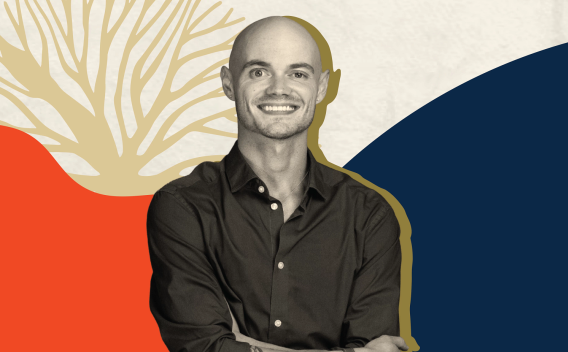By
Published
June 28, 2023
Tags
SUMMARY:
Anathea Chino is the Co-Founder and Executive Director of Advance Native Political Leadership (Advance), which works to build a complete ecosystem approach to political power building in Native communities. Here, Anathea talks about the pivotal moment that led her to launch Advance, reflects on getting more Native leaders elected to public office, and shares how her identity as a queer Acoma Pueblo woman intersects with these efforts.
This interview is part of Roots to Branches, an ongoing series featuring conversations with leaders working to build a more just and inclusive world. The series highlights the unique journeys that brought these leaders to where they are today and their visions for the road ahead. To explore more conversations in the Roots to Branches series, check out Schusterman’s digital magazine, Toward.
Anathea Chino (she/her) leads the first and only national Native-led organization working to build a complete ecosystem approach to political power building in Native communities, including leadership development and support, candidate recruitment, voter engagement, and pathway development.
Chino co-founded Advance Native Political Leadership (Advance) to address the need for increased Native American representation in elected and appointed office at all levels across the country. Schusterman partners with Advance through its Gender and Reproductive Equity Grantmaking portfolio as part of a commitment to invest in organizations and civic groups that increase and support the political leadership of women.
As Co-Founder and Executive Director of Advance, Chino works tirelessly to bring more Indigenous people, women of color, LGBTQ+ and Two Spirit people into the U.S. political landscape. I spoke to Anathea about how her life experiences inform her leadership of an organization working to increase representation in our political system.
What led you to co-found Advance Native Political Leadership?
It started in 2015, when a dear friend published a report which found that a vast majority of elected positions in the U.S. are still held by straight white men. While the report itself was not surprising, I started wondering, what would it look like if our government was truly inclusive of Indigenous leaders and communities?
I reached out to a Native advisor to brainstorm how we could address the disparity and approached my friend whose organization had published the report with some ideas I had for research and collaboration, particularly to ask questions that for years I had wanted to ask Native leaders nationwide about Native American political participation. In partnership with Chrissie Castro (Najavo/Chicana) and Laura Harris (Commanche), that set in motion a year and a half of interviews across the country to figure out what it would take for us to create pathways for equitable representation, and what was being done locally so we could unite nationally.
One of the things that came out of that process was an awareness that there was no national organization for political power-building among Native Americans. It was this awareness that led us to co-found Advance with Chrissie Castro (Navajo/Chicana), Executive Director of California Native Vote Project; Kevin Killer (Oglala Lakota), a former South Dakota State Senator and the former President of the Oglala Sioux Tribe; and Lieutenant Governor Peggy Flanagan (White Earth Band of Ojibwe) of Minnesota.
How does your personal identity as an LGBTQ leader shape your leadership in working for Native American/Indigenous political representation?
This unique identity of mine is something that I navigate all the time, to be honest. I didn’t come out until my forties. I come from Acoma Pueblo—people who are typically quiet, culturally rich but socially conservative. Being an outspoken, queer woman leader with that upbringing can make leadership a bit uncomfortable. But as a Native person, I also grew up around strong Native women and beautiful examples of gender fluidity in our traditional ceremonies.
It took me a long time to get here, but I feel like I am fully centered in my purpose on Earth. I have the privilege of doing historic work that’s never been done before, and I have found my voice by creating safer spaces and helping to grow support for the staff at Advance and for the Native leaders we’re bringing into the American democratic system. My identity is now tied up in every single thing I do, and it is something I feel incredibly proud of.
What are the greatest challenges to your work?
Right now, more than ever, we’re facing a fight for truth, and for a history of our country that does not erase Indigenous people. Secondly, it’s often challenging to ask Native Americans, a community that lives with the historical trauma of violence done to us throughout the history of the United States, to run for office.
By asking Indigenous people to do this, we’re asking them to participate in a system that has long wanted to eradicate us. That’s a hard sales pitch. And we have to acknowledge the beautiful, real work being put in by Native activists outside of the system, like those fighting oil and natural gas pipelines being built on Native land. However, it’s so important to have people both inside and outside of our democratic system fighting to protect us.
When you have examples of powerful Native people in elected office, we can demonstrate what it looks like to be proactive as well as reactive to have a long-term strategy for progress.
What changes are you working toward this year and long-term? Are there any new programs or initiatives we should know about?
We are investing in research about Native voters, data collection, political message development and polling as part of our Native PowerBase project. This is the first time any research like this has been done on a national scale, and we are so excited about it.
We’re also launching our Native Elected Leaders Network program this year. The work to build that has been so rewarding because it’s allowed us to conduct interviews with Native elected officials across the country and hear their stories about their path to leadership. We’re then going to pair these experienced folks with newly-elected Native leaders as mentors, with the intent of building stronger networks nationwide.
Long-term, the vision we are building toward every single day is what we call “remember the future.” It’s electing leaders that embody the Indigenous values of reciprocity, redistribution, responsibility and relationships so we can move towards a democracy that is reflective of all of us. We recognize that we are simply holding the baton at this moment, that we might not see the fruits of our labor in our lifetime. But we also have hope that the change we are working for is going to come, and we know that we are on the right side of history.
The “remember the future” vision gives us this foundation of trust and drives our work.
Native women, queer people and Two-Spirit people are really leading the charge of getting more Indigenous people into elected office–and they’re just bravely stepping in, taking up space where we’ve been told for generations that there’s no place for us.
What trends or changes are giving you hope?
Our organization operates on this foundational idea that hope is a discipline. We need to be hopeful. And there’s so much to be hopeful about—like how there are more Indigenous people in really powerful elected and government positions than we’ve ever had in our lifetimes!
There’s Deb Haaland (Laguna Pueblo), Secretary of the Interior, the first Native American to serve as a Cabinet Secretary, and one of the first Native American women to serve in Congress. There’s Peggy Flanagan, who’s now serving her second term as Lieutenant Governor of Minnesota. Native women, queer people and Two-Spirit people are leading the charge of getting more Indigenous people into elected office–and they’re just bravely stepping in, taking up space where we’ve been told for generations that there’s no place for us.
All of these new leaders are stepping into these roles knowing that they’re the first, but they won’t be the last because they are building on the momentum of all these amazing examples. The more Native leaders we get elected, the more will follow.
Recognizing and building on these victories helps us believe that in the long run, we will win. Democracy will win.
We’re speaking together during Pride Month. What are you celebrating for Pride this year?
What I’m celebrating is that, as someone like me who is incredibly private, who was closeted for 35 years, I’m now in a very public role. I’m talking about my identity as a queer person and creating pathways for young queer people, showing them that they have someone looking out for them. I feel incredibly proud but also an incredible amount of responsibility.
Here’s a very personal example. When I came out, one of the first people I came out to was my little nine-year-old cousin. We had a conversation about what it meant for me to say that I was a queer person. The very next day, he wrote on a notepad and gave it to me. The first page said “I,” on the second page it said “Am,” and the third page said “Gay.” When he gave this to me, he looked at me, and he looked so scared. I cry every time I think about it.
I am doing everything I do for him, for the next generation of queer, Indigenous people being born, whose lives are under threat in so many ways. Everyday, we think about the ways we can impact their lives as elected leaders, the policies we can change and services we can get to them that can change their lives. And we have to celebrate these young queer people in every way we can every single day.
Charles and Lynn Schusterman Family Philanthropies welcomes the expression of personal thoughts and reflections in Toward, our digital magazine. Each post reflects the opinion of its author and does not necessarily represent the views of our organization or our partners.





